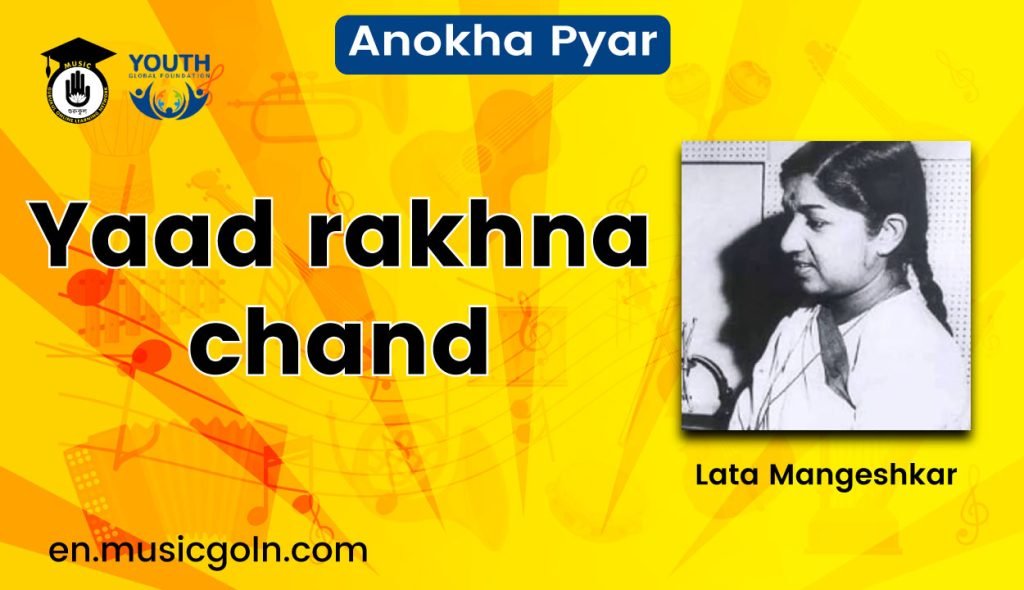Yaad rakhna chand lyrics | Lata Mangeshkar| Anokha pyar | 1948
Singer: Lata Mangeshkar, Ira Nagrath, Mukesh
Lyricist: Behzad Lakhnavi, Shams Azimabadi, Zia Sarhadi, Gopal Singh Nepali
Music Director: Anil Biswas
Anokha Pyar is a 1948 Indian Hindi language film starring Dilip Kumar, Nargis and Nalini Jaywant. The black and white romantic love triangle was directed by M. I. Dharamsey under the Ambika Films banner. The music was composed by Anil Biswas, who gave a then unknown young Lata Mangeshkar quite a few songs to sing for the film. The rest of the cast included Sankatha Prasad, Mukri, Ved, Kesarbai, Habib and Sheikh.
Ashok (Dilip Kumar) is an impoverished writer waiting for his book to be published. He meets Bindiya (Nalini Jaywant), a flower-seller, who insists he buy some flowers from her. Ashok gives his last two annas to her. A rogue tries to snatch the money from Bindiya and when Ashok tries to help her, the rogue punches him in the face, temporarily blinding him. Bindiya takes him to the local doctor.
Since he has nowhere to stay, Ashok stays with the doctor and his family until he improves. The doctor’s daughter Geeta (Nargis) falls in love with Ashok. Bindiya has also fallen in love with Ashok and cares deeply for him. Ashok is implicated in a murder case and is imprisoned. Geeta’s father dies and her two aunts come to stay with her. Meanwhile.
Bindiya manages to find a suicide note written by Ashok’s alleged victim and Ashok is proven to be innocent. Geeta’s aunts happen to see Bindiya with Ashok and believe her to be Ashok’s wife. They convince Geeta to marry Ashok’s publisher. After some more melodramatic turns in the story, Bindiya dies and Ashok and Geeta unite. Ashok’s book is finally published and becomes popular.
Yaad rakhna chand lyrics | Lata Mangeshkar| Anokha pyar | 1948
Yaad rakhna chand lyrics :
yad rakhana chand taro iss suhani rat ko
yad rakhana chand taro iss suhani rat ko
do dilo me chupake chupake jo huyi so bat ko
do dilo me chupake chupake jo huyi so bat ko
yad rakhana chand taro iss suhani rat ko
yad rakhana
aa gayi mere chaman me bhul kar kaise bahar
aa gayi mere chaman me bhul kar kaise bahar
jhum kar bajane lage hain aaj mann veena ke tar
jhum kar bajane lage hain aaj mann veena ke tar
yeh khushi uthati huyi yeh jindgi hansati huyi
yeh khushi uthati huyi yeh jindgi hansati huyi
yad rakhana chand taro iss suhani rat ko
yad rakhana
aasman par aasman ke premiyo kaa mel hai
aasman par aasman ke premiyo kaa mel hai
jindgi ke kone kone me khushi kaa khel hai
jindgi ke kone kone me khushi kaa khel hai
araju machhali huyi yeh jindgi hansati huyi
yad rakhana chand taro iss suhani rat ko
yad rakhana chand taro iss suhani rat ko
yad rakhana
Lata Mangeshkar (born as Hema Mangeshkar; 28 September 1929 – 6 February 2022) was an Indian playback singer and occasional music composer. She is widely considered to have been one of the greatest and most influential singers in India.Her contribution to the Indian music industry in a career spanning eight decades gained her honorific titles such as the “Queen of Melody”, “Nightingale of India”, and “Voice of the Millennium”.
Lata recorded songs in over thirty-six Indian languages and a few foreign languages, though primarily in Marathi, Hindi, and Bengali.Her foreign languages included English, Russian, Dutch, Nepali, and Swahili.She received several accolades and honors throughout her career. In 1989, the Dadasaheb Phalke Award was bestowed on her by the Government of India.In 2001, in recognition of her contributions to the nation, she was awarded the Bharat Ratna, India’s highest civilian honour;
she is only the second female singer, after M. S. Subbulakshmi, to receive this honour.France conferred on her its highest civilian award, Officer of the National Order of the Legion of Honour, in 2007.
She was the recipient of three National Film Awards, 15 Bengal Film Journalists’ Association Awards, four Filmfare Best Female Playback Awards, two Filmfare Special Awards, the Filmfare Lifetime Achievement Award and many more. In 1974, she was one of the first Indian playback singers to perform at the Royal Albert Hall in London, UK. Her last recorded song was “Saugandh Mujhe Is Mitti ki” released on 30 March 2019 as a tribute to the Indian Army and the Nation.
At one point, she appeared in the Guinness World Records, which listed her as the most recorded artist in history between 1948 and 1987
Mangeshkar was born on 28 September 1929: 67 in a Maharashtrian Brahmin familyin Indore, (in the present-day Indore district of Madhya Pradesh and then the capital of the princely state of Indore which was part of the Central India Agency in British India). Her father, Deenanath Mangeshkar, was a Marathi and Konkani classical singer and theatre actor.
One of her first major hits was “Aayega Aanewaala,” a song in the movie Mahal (1949), composed by music director Khemchand Prakash and lip-synced on screen by actress Madhubala.This was a defining moment for her, and a catalyst for the recognition of playback singers in India. Before this, playback singers were seen as the vocal equivalent of a stuntman and remained invisible and uncredited. This song was such a big hit, that Radio Goa revealed her identity and she became a star in her own right. This opened the door for other playback singers to achieve the recognition they deserved.
Read more:
- Mere phoolon men chhipi hai lyrics | Lata Mangeshkar | Anokha pyar | 1948
- Mere liye wo gham e intezar lyrics | Lata Mangeshkar | Anokha pyar | 1948
- Jevan sapna toot gaya lyrics | Lata Mangeshkar | Anokha pyar | 1948
- Ghadi ghadi poocho na lyrics | Lata Mangeshkar | Anokha pyar | 1948
- Ek dil ka lagana lyrics | Lata Mangeshkar | Anokha Pyar | 1948
